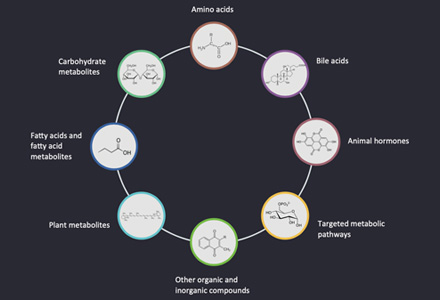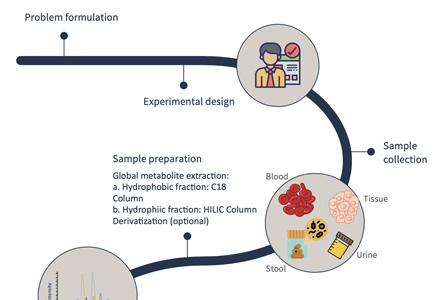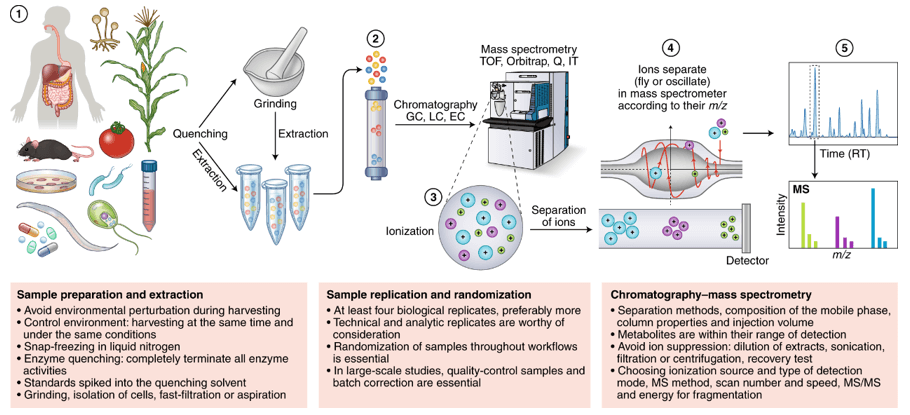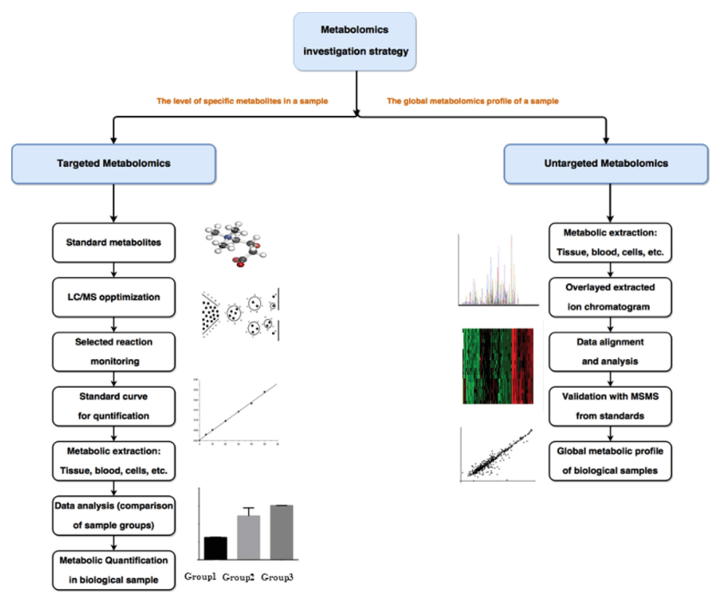Overview
Metabolomics is a comprehensive, unbiased, high-throughput comparative tool to study global metabolites levels in samples from various conditions. Compared to targeted metabolomics, untargeted metabolomics is an intended comprehensive analysis of all the measurable analytes in a sample including chemical unknowns. These analytes are small molecules and usually include sugars, amino acids, peptides, fatty acids, lipids, alkaloids, phenolic compounds, and so on. As a high-throughput tool, untargeted metabolomics provides a powerful way to early stage diagnosis and discovery of novel biomarkers to a great extent, potentially leading to new insights in disease mechanism or treatment. More importantly, untargeted metabolomics allows more comprehensive analysis with more accurate data acquisition, eliminating biased research direction. A general procedure of untargeted metabolomics analysis contains multiple steps, including sample collection, metabolites extraction, metabolites detection/identification, data collection/analysis, identification/quantification of metabolites and pathway analysis/reconstruction2 (Figure 1). We provide a broad variety of untargeted metabolomics services in animals, covering hundreds of metabolites ranging from small water-soluble molecules to large lipids.
The Main Applications of Untargeted Metabolomics Service
Biomarker discovery
Disease diagnostics
Drug discovery
Food safety
Metabolic disease research
Environmental health
Creative Proteomics has extensive experience working with many types of samples and performinsampling to bioinformatics analysis.
Advantages of Our Untargeted Metabolomics Service
Rich experience in various human and animal sample processing and metabolite preparation
Cutting-edge MS platforms: LC-MS, GC-MS; NRM, and so on
Professional statistical analysis and bioinformatics analysis
The complete analysis report is offered, including method interpretation, data and result files
Competitive price
Short turnaround time
Service Workflow
The human and animal untargeted metabolomics service provided by Creative Proteomics is based on our cutting-edge chromatographic separation and mass spectrometry platforms. The experimental workflow involves 6 steps: sample collection, metabolites extraction, metabolites detection/identification, data collection/analysis, identification/quantification of metabolites and pathway analysis/reconstruction (Figure 1). Our service will be tailored to specific samples and needs for optimal results.
 Figure 1. The overall workflow for the untargeted metabolomics analysis (Vinayavekhin and Saghatelian, 2010)
Figure 1. The overall workflow for the untargeted metabolomics analysis (Vinayavekhin and Saghatelian, 2010)
Sample Requirements
We can analyze any biological materials including but not limited to biofluids, cells and solid tissues from humans and animals, such as mice, rats, rabbits. For best results, we suggest rapidly freezing samples in liquid nitrogen followed by storage at -80ºC. If you need transport your samples to us, please follow the below requirements for different types of sample:
- Blood/plasma: 500ul/sample
- Urine: 1ml/sample
- Tissue: 200mg/sample
- Cells: 1x107/sample
- Feces: 500mg/sample
- Shipment condition: dry ice
Report delivery
- Experimental procedures
- Parameters of liquid chromatography and mass spectrometry
- MS raw data files and the summary of MS data quality
- The identification/quantification of metabolites
- Bioinformatics analysis report
Our experts with extensive experience in metabolomics and bioinformatics will help you plan, conduct, and report your metabolomics studies. If you want to study the whole metabolome, complex lipids, or just a few metabolites or pathways, we will closely work with you to define research purposes and develop customized plans. Welcome to contact us to find out how your scientific research can benefit from our human and animal untargeted metabolomics analysis service.
References
- Schrimpe-Rutledge A. C.; et al. Untargeted metabolomics strategies – Challenges and emerging directions. J Am Soc Mass Spectrom. 2016, 27(12): 1897–1905.
- Vinayavekhin N.; Saghatelian A. Untargeted metabolomics. Current protocols in molecular biology. 2010, 30.1.1-30.1.24.
For Research Use Only. Not for use in diagnostic procedures.


 Figure 1. The overall workflow for the untargeted metabolomics analysis (Vinayavekhin and Saghatelian, 2010)
Figure 1. The overall workflow for the untargeted metabolomics analysis (Vinayavekhin and Saghatelian, 2010)


